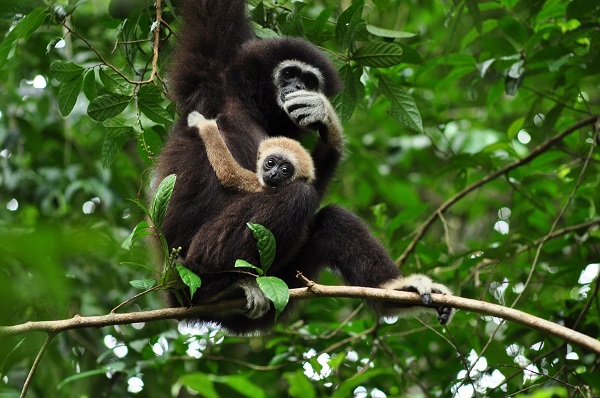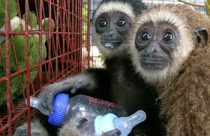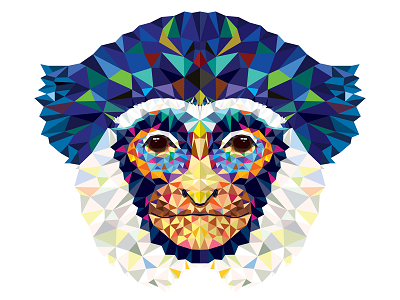Give a Gibbon a chance for a new life…
Most of the Gibbons we take care of come to us in a pitiful state. Malnourished, abused, traumatised and often diseased. It takes years of dedicated care to get our wards to a healthy state where they can be integrated back with other Gibbons, let alone released back into the wild.

This project is about doing the right thing in redressing the exploitation of these sensitive animals, and giving them a chance for a happy wild existence during the remainder of their short lives.
The lucky Gibbons are those who bond as families. Experience has taught us that family units have a much greater chance of returning to the wild than individual animals. The chances of success are even greater if they are released with an infant.




Releasing Gibbons back into the wild takes a long time. Initially they will spend 2-3 years being nursed back to health, and hopefully eventually encourage to bond with another Gibbon.
Gibbons behavior is the closest to humans. They live in family units only, not groups, and they bond for life roaming in a 2 Square Km (approx.) area which they are very territorial about.
 Rehabilitation of Gibbons back to the wild, is a very slow methodical, painstaking process perfected after years of research and study.
Rehabilitation of Gibbons back to the wild, is a very slow methodical, painstaking process perfected after years of research and study.
Once a pair of Gibbons is judged fit for release they will be transferred to Baan Jam Pee in Chiang Mai and placed in a training cage, lower down in the forest, in order to acclimatize themselves with the local environment and food.
After 2-3 months, they will moved higher into the forest into a bamboo release cage where they will stay for 2-3 weeks, increasingly encouraged to leave the cage to forage for themselves, but still having use of the cage to shelter in, until eventually they are closed off from the cage and food supply.
Even after this much time, some Gibbons are unable to stay in the wild and must be taken back to the sanctuary.
The Gibbons have to undergo many stages before they are able to fend for themselves in their natural habitat.

Then the difficult process begins, since for the next two years after release, they must be tracked – daily for the first year – to ensure they are healthy and coping well.
All during this time the volunteers and staff must keep their distance to avoid the Gibbons becoming attached to them.

How you can help?
It costs approximately USD 1,500 for each animal to be taken care of from Phuket, and then sent on to Chiang Mai for eventual release. Why not sponsor a Gibbon and help change its life? Any size donation small or large will help. Don’t be shy!
At the bottom of this page are links for donating via Paypal, or our bank details.

In addition to financial help, we need feet on the ground to help in all stages of this project. If you have some time to spare, and want to get involved in something worthwhile, please get in touch with the Gibbon Project.
Update : July 2nd 2014 :
YSE Marine Phuket, kindly manufacture and assemble a new training cage for Baan Jam pee

Donations for the Gibbon Project – Any Amount!
Kasikorn Bank, Thanon Suthep Branch, Chiang Mai
Account Name: The Wild Animal Rescue Foundation of Thailand For GRPC
Account No. : 471-2-38244-4 . Swift Code. : K A S I T H B K
WARF IS A FULLY LICENSED CHARITY UNDER THAI LAW – LICENSE NO. GT 20.Qualified Charitable Organization in Thailand for TAX DEDUCTION license No. 741







Comments are closed.